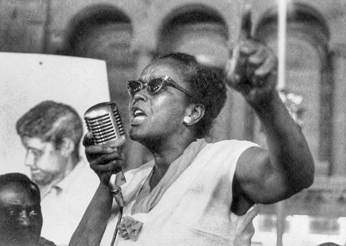
The Student Nonviolent Coordinating Committee (SNCC) was one of the most influential organizations to participate in the civil rights movement of the 1960s. Although SNCC is best known for its role in the Freedom Rides of 1961 and is often associated with voter registration and other civil rights activism in Alabama and Mississippi, it had significant roots in North Carolina. After a sit-in by four black students from the North Carolina Agricultural and Technical College in Greensboro on 1 Feb. 1960 sparked a wave of similar demonstrations around the state and region, the Southern Christian Leadership Conference (SCLC) quickly moved to consolidate grassroots student activism and map a strategy for further protests. At the urging of its interim executive director, Ella Baker, the SCLC hosted a conference at Shaw University in Raleigh on 15-17 Apr. 1960 to unite student activists who had been newly energized by the sit-in movement.
Baker, a Norfolk, Va., native who had grown up in Littleton, N.C., before attending Shaw, persuaded the SCLC to bring the conference to her alma mater and to provide gas money to students who attended. Once the meeting convened, Baker successfully advocated that the nascent organization be student-directed rather than under the SCLC umbrella. Representatives of other bodies, such as the National Association for the Advancement of Colored People (NAACP) and the Congress of Racial Equality, also were present, lobbying students to affiliate with their groups. The weekend keynote speaker, the Reverend James Lawson of Nashville, criticized established groups such as the NAACP as too slow and conservative. In a rousing sermon, the Reverend Martin Luther King Jr. addressed 1,600 conference delegates and Raleigh citizens in Memorial Auditorium on Saturday night, urging students to adopt the nonviolent philosophy of Mohandas K. Gandhi and, if necessary, face jail time for peaceful protest. The conference concluded with the formal creation of SNCC.
The committee held its first meeting in Atlanta on 13 May 1960, hired one staffer, and set up an office independent of the SCLC. Its first president was Marion Barry, a Fisk University student who later became mayor of Washington, D.C. That fall, SNCC helped coordinate sit-ins and other acts of nonviolent civil disobedience throughout the South. In the spring of 1961, following a U.S. Supreme Court decision ending segregation of the transportation industry, SNCC members confronted violent opposition as Freedom Riders on buses that carried integrated groups of passengers from Washington, D.C., and Nashville through the Carolinas, Georgia, Alabama, and Mississippi. Later, the activists played a key role in the 1963 March on Washington and constituted the "shock troops" and frontline leaders during the Mississippi Freedom Summer of 1964. Historian John Hope Franklin called them "probably the most courageous and the most selfless" civil rights workers.
In 1966 Stokely Carmichael, a former Shaw student and a participant in the 1961 Freedom Rides, was elected chairman of SNCC. Under his leadership, the committee grew increasingly outspoken, with significant links to the Black Power movement. SNCC was disbanded in 1970.